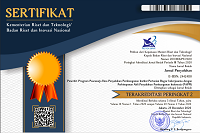The prominent role of agricultural advisory services on cocoa agribusiness development in Aceh, Indonesia
Abstract
This paper aims to analyze the cocoa extension system and factors influencing agribusiness performance on cocoa production. Research was conducted in Pidie Jaya and Southeast Aceh District in July – October 2019. Data and information were gathered from 10 extension workers and 352 cocoa farmers by survey methods. The research result showed that cocoa extension system in Aceh consist of subsystem innovation policy, generating subsystem, delivery subsystem and receiving subsystem. The public extension services have reached 84.66% farmers and private extension services have facilitated 75.85% farmers, and only 11.93% farmers by farmer's leaders. There were a significant correlation between supporting advisory services with the cocoa agribusiness performance. The role of local community has a strong influence in disseminating and implementing technology on cocoa agribusiness. There are different issues need to solve cocoa agribusiness managed by small-scale farmers are price incentive policies, supporting fermentation and marketing units of cocoa beans, stimulating the establishment of cocoa processing industry and increasing the quality of advisory services.
Keywords: agribusiness performance, cocoa farming, extension system
Downloads
References
Amanah, S. (2008). Sistem Penyuluhan Perikanan Dalam Mengantisipasi Era Perubahan. Jurnal Penyuluhan, 4(2), 139 – 151.
Angela, & Efendi, D. (2015). Pruning Management of Cacao (Theobroma cacao L.) in Cilacap, Central Java. Buletin Agrohorti, 3(3), 285 – 293.
Arabiun, A.G. (2014). The Importance of Management for Growing and Developing Agribusiness SMEs: Designing a Conceptual Framework. International Review, 1-2, 25 – 44.
Ayalew, T., Mamo, M., & Kebedom, A. (2015). An Analysis of Agricultural Linkage and Technology Innovation System: with Special Focus in Ethiopia. International Journal of Science and Research, 4(3), 889 – 894.
Central Bureau of Statistics. (2018). Indonesian Cocoa Statistics. Jakarta: BPS-Statistics Indonesia.
Ferroni, M., & Castle, P. (2011). Public-Private Partnerships and Sustainable Agricultural Development. Sustainability, 3, 1064-1073
Gombe, S.Y., Suandi, T.B., Ismail, I.A., & Omar, Z. (2016). Extension Education’s Role towards Community Empowerment in Nigeria: Issues, Challenges and Prospects. Journal of Education and Social Policy, 3(2), 135 – 142.
Harli, M., Irham, & Jamhari. (2018). The Importance of Agribusiness Five Sub-System in The Cocoa Development in West Sulawesi. HABITAT, 29(2), 84-91.
Herman, Hutagaol, M.P., Sutjahjo, S.H., Rauf, A., & Priyarsono, D.S. (2006). Analisis Faktor-Faktor yang Memengaruhi Adopsi Teknologi Pengendalian Hama Penggerek Buah Kakao: Studi Kasus di Sulawesi Barat. Jurnal Pelita Perkebunan, 22(3), 222 – 236.
Hubeis, A.V. S. (2007). Motivation, Job Satisfaction and Productivity of Agriculture Extension Worker: Case Study of Sukabumi District. Jurnal Penyuluhan, 3(2), 90 – 99.
Indraningsih, K.S. (2017). Agricultural Innovation Dissemination Strategy in Supporting Agricultural Development. Forum Penelitian Agro Ekonomi, 35(2), 107-123.
Islam, I., Hoque, M. J., Miah, M. A. M, & Sheheli, S. (2013). Competency Assessment of The Farmers on The Application Of One House One Farm Approach. Progressive Agriculture, 24(1-2), 291 – 299.
Khairudin, Saty, F. M., & Supriyatdi, D. (2015). Analysis of Adoption Factors of PsPSP Method for Handled Cocoa Podborer Infection in Kuripan Village. Jurnal Agro Industri Perkebunan, 3(1), 34 – 46.
Klein, K. J., & Knight, A. P. (2005). Innovation Implementation, overcoming the challenge. Current Directions in Psychological Science, 14(5), 243 – 246.
Kusumastuti, A. (2015). Modal Sosial dan Mekanisme Adaptasi Masyarakat Pedesaan Dalam Pengelolaan dan Pembangunan Infrastruktur. MASYARAKAT: Jurnal Sosiologi, 20(1), 81-97.
Michael, F., Adisa, B. O., & Alabi, D. L. (2019). Factors Influencing Role Performance of Community Leaders in Rural Development Activities in Southwestern Nigeria. Acta Universitatis Agriculturae et Silviculturae Mendelianae Brunensis, 67(2), 473 – 483.
Rubiyo, & Siswanto. (2012). Peningkatan Produksi dan Pengembangan Kakao (Theobroma cacao L.) di Indonesia. Buletin RISTRI, 3(1), 33-48.
Sadono, D., Sumardjo, Gani, D. S., & Amanah, S. (2014). Farmer Empowerment in The Management of Rice Farming in Two Districts in West Java. Journal of Rural Indonesia, 2(1), 104-120.
Sapar, Yusuf, M.Q., & Haedar. (2014). Hubungan Kinerja Penyuluh Pertanian Dengan Kompetensi Petani Kakao Dalam Peningkatan Produktivitas Kakao di Kota Palopo, Kabupaten Luwu, Luwu Utara Dan Luwu Timur. Jurnal Ekonomi Pembangunan, 1(2), 67 - 76.
Savran, F., Demiryürek, K., Özçatalbaş, O., Akin, A., & Boz, Đ. (2011). The Agricultural Extension System and Practices in Turkey. Scientific Research and Essays, 6(8), 1831-1838.
Sumardjo. (1999). Transformasi Model Penyuluhan Pertanian Menuju Pengembangan Kemandirian Petani, Kasus di Propinsi Jawa Barat. Bogor: Institut Pertanian Bogor.
Syahyuti. (2014). Peran Strategis Penyuluh Swadaya Dalam Paradigma Baru Penyuluhan Pertanian Indonesia. Forum Penelitian Agro Ekonomi, 32(1), 43 – 58.
Syakir, M. (2016). Pemantapan Inovasi dan Diseminasi Teknologi Dalam Memberdayakan petani. [Prosiding]. Dipresentasikan pada Consolidation of Innovation and Dissemination of Technology. Tersedia pada pse.litbang.pertanian.go.id › ind › pdffiles › prosiding_2016
Tresliyana, A., Fariyanti, A., & Rifin, A. (2015). Daya Saing Kakao Indonesia di Pasar Internasional. Jurnal Manajemen dan Agribisnis, 12(2), 150-162.
Utaranakorn, P., & Yasunobu, K. (2014). Farm Managerial Competency Level of Farmers in Northeastern Thailand. Japanese Journal of Farm Management. 52(4): 43 – 48.
Authors who publish with this journal agree to the following terms:
- Authors retain copyright and grant the journal right of first publication with the work simultaneously licensed under a

This work is licensed under a Creative Commons Attribution 4.0 International License that allows others to share the work with an acknowledgement of the work's authorship and initial publication in this journal. - Authors are able to enter into separate, additional contractual arrangements for the non-exclusive distribution of the journal's published version of the work (e.g., post it to an institutional repository or publish it in a book), with an acknowledgement of its initial publication in this journal.
- Authors are permitted and encouraged to post their work online (e.g., in institutional repositories or on their website) prior to and during the submission process, as it can lead to productive exchanges, as well as earlier and greater citation of published work (See The Effect of Open Access).















